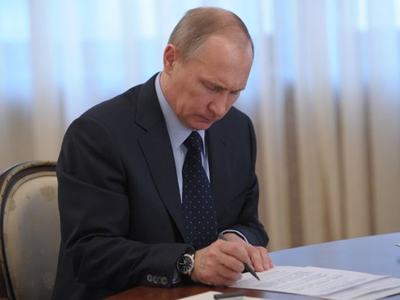 Russian President Vladimir Putin has signed the Federal Law on the Russian Pension Fund’s Budget for 2018 and the planning period of 2019-2020.
Russian President Vladimir Putin has signed the Federal Law on the Russian Pension Fund’s Budget for 2018 and the planning period of 2019-2020.
According to the budget, the Pension Fund’s expenditures on the payment of pensions to Russians will increase by 279 billion rubles to 7.15 trillion rubles in 2018. Expenditures on the payment of social benefits will grow by 11.8 billion rubles to 981 billion rubles.
The PFR budget envisages an increase of insurance pensions with due account of the temporarily modified procedure of insurance pensions’ indexation. Social pensions and other types of state pensions will be increased consistent with the current pension laws and with due account of the index of growth of the pensioner’s subsistence minimum in 2017.
Insurance pensions of non-working pensioners, including the fixed payment, will grow by 3.7% on January 1, 2018, which is above the forecasted inflation rate. The increased fixed payment will amount to monthly 4,982.9 rubles, and one pension point will reach 81.49 rubles (78.58 rubles in 2017). As a result, an average annual old-age insurance pension will grow to 14,075 rubles (161.3% of the pensioner’s subsistence minimum).
State pensions, including social ones, will be raised by 4.1% on April 1. Once this happens, an average annual social pension will amount to 9,045 rubles (103.7% of the pensioner’s subsistence minimum). An average social pension of children with disabilities and persons with lifelong disabilities of the first group will reach 13,699 rubles.
Same as before, there will be no pensioners in Russia in 2018 with a monthly income smaller than the pensioner’s subsistence minimum in effect in the home region. All non-working pensioners will receive a social supplement, which will increase their pensions to the pensioner’s subsistence minimum. Given a possible decline of the regional pensioner’s subsistence minimum, the amount of material support to non-working recipients of federal social supplements will be retained at least on the level of December 31, 2017. The PFR budget assigned 94.5 billion rubles for those purposes.
According to the draft budget, 14.7 billion rubles will be assigned for paying pension savings in the form of funded pensions, and term and lump-sum payments.
Starting February 1, 2018, the monthly benefit received by federal benefit holders will be increased by the inflation rates forecasted for 2017, i.e. 3.2%. The Pension Fund will assign 450.6 billion rubles for paying monthly social benefits.
Russians looking after persons with disabilities will continue to receive monthly compensations of 1,200 rubles, while the Pension Fund will be paying 5,500 rubles per month to non-working parents of children with disabilities and persons with lifelong disabilities. Such expenditures are due to reach 73.2 billion rubles in 2018.
In 2018, the Pension Fund will continue to issue maternity capital certificates and pay maternity capital funds. The PFR budget assigns 341.4 billion rubles for this activity. The size of maternity capital will not change in 2018: it will remain at 453,026 rubles.
The Pension Fund’s budget for 2018 has balanced income and expenditures. The PFR revenue and expenditures unrelated to the formation of pension savings will amount to 8.236 billion rubles. Budget expenditures on forming pension savings will be 106.6 billion rubles larger than revenue, because of the transfer of pension savings to private pension funds at the request of insured persons. The shortfall will be compensated for with pension savings transferred (returned) to the state and private management companies. They amount to 1,111.2 billion rubles as of January 1, 2018.
The overall revenue of the Pension Fund’s budget is expected to reach 8,333.3 billion rubles or 8.6% of Russia’s GDP in 2018. The PFR budget will have 8,439.9-billion-ruble expenditures or 8.7% of Russia’s GDP
Insurance pension will remain the principal type of pension in Russia in 2018. It will be received by over 40 million people. Some 3.7 million people will receive state pensions.
In 2018, PFR will continue to subsidize social programs of Russia’s constituent territories for the purpose of construction and renovation of social facilities for senior citizens and persons with disabilities, development of their physical infrastructure, and computer training of pensioners. The Pension Fund provides those subsidies to co-fund social programs of Russian regions. The PFR budget increased allocations for those purposes from 1 billion rubles to 2 billion rubles in 2018.
